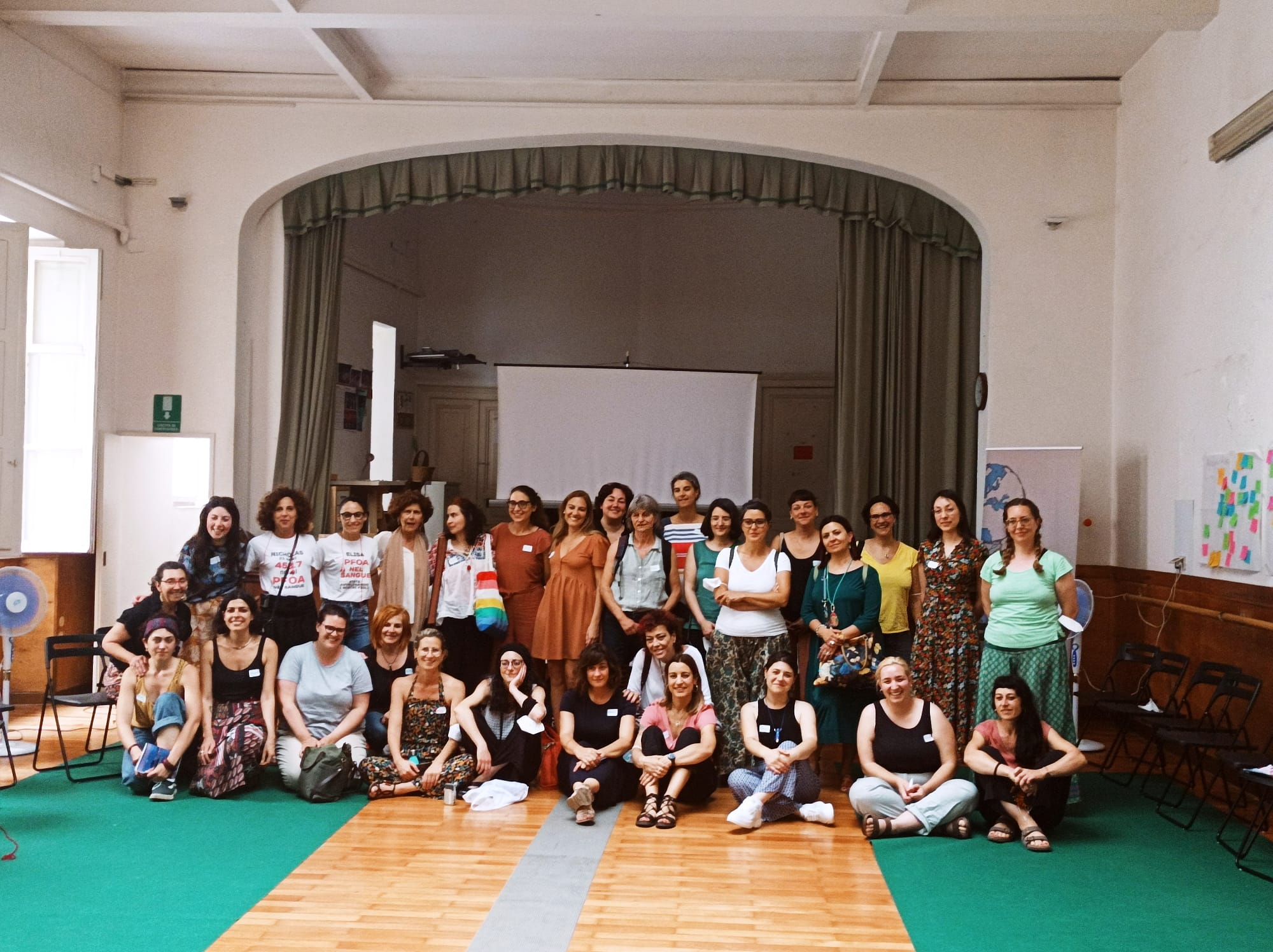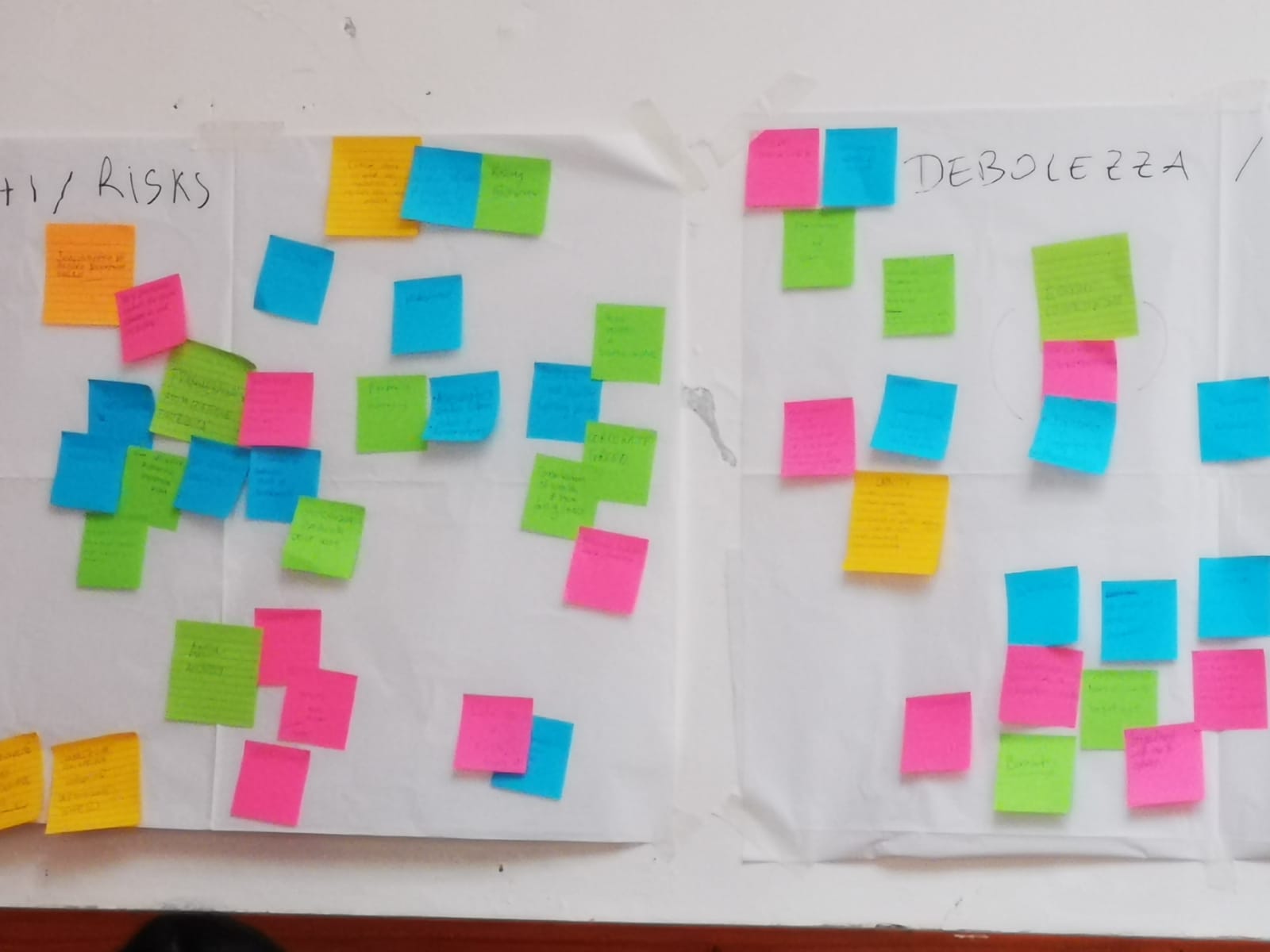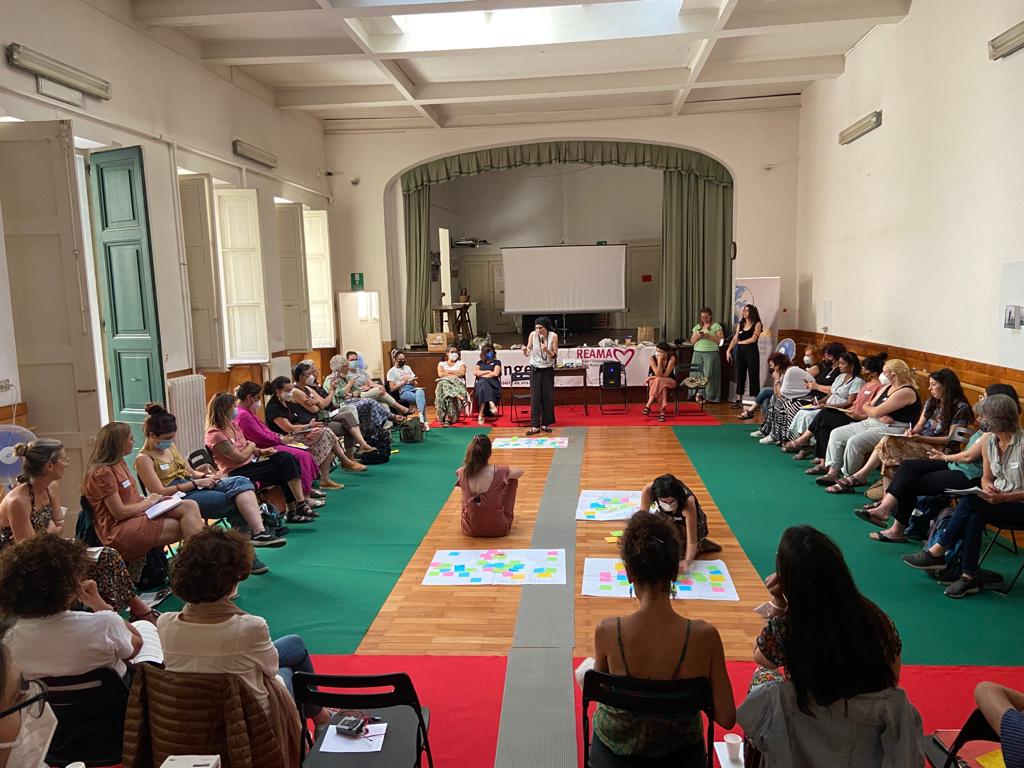Rome, 17 June 2022 – Pangea Foundation and WEGO-ITN organized the “Wangari Maathai” workshop in collaboration with the association A Sud.
The aim of the event was to create a space for women working in different fields linked to feminism and ecology to come together and exchange experiences, practices, knowledge and opinions.
Women activists, entrepreneurs, politicians, researchers met and created new nexuses between theories and practices, new definitions and possible actions. Around 40 women working on gender and the environment participated in the workshop (take a look at some of their bios below), some coming from different parts of Italy and abroad. Participants presented and positioned themselves and shared their definition of ecofeminism.
They shared how they stood with respect to their struggles, their territories and themselves. They searched for new words and meanings, exchanged practices and identified those in which they recognised themselves the most.
The workshop was an opportunity for all participants to gather, meet new people, find new energy and connections to act collectively for environmental and gender justice.

A preliminary look into the future
During the encounter, participants discussed the future of WEGO-ITN project and proposed a preliminary plan of action for the next two years. At the core, it was proposed that the network continued developing their FPE Dialogues, by expanding them to different spaces and undertaking activist research with people engaged in intersectional intergenerational environment justice in communities/ institutional arenas. The idea is to bring together their stories and strategies in a series of FPE Dialogues and to focus on local/global engagements expanding the spaces where WEGO-ITN engage, particularly in the global south..

List of participants
Ana Agostino
Dr. Ana Agostino is the Ombudsperson for Montevideo, Uruguay and lecturer in Development and Culture at the University CLAEH. She graduated as a Social Worker from the University of the Republic, Uruguay, did postgraduate studies at the University of Bremen, Germany, and has a PhD in Development Studies from the University of South Africa (UNISA). She was a research fellow at UNISA at the departments of Latin American Studies (2000) and Development Studies (2005-2006) and Guest Researcher at the Institute for Advanced Sustainability Studies (IASS) in Potsdam, Germany (2013).
Gulay Çaglar, Freie Universität Berlin
Gülay Çaglar is Professor for Gender and Diversity at the Otto-Suhr-Institute of Political Science at Freie Universität Berlin. Caglar studied political science and economics and received her PhD in political science in 2007 from the University of Kassel, where she also worked as a research associate. Her research interests include Critical Food Studies, Feminist International Political Economy, Transnational Feminisms and International Governance. In her current research she investigates how shifts in gendered food practices (production, consumption, food preparation) and food activism affect policy priorities in international food governance.
Khayaat Fakier, Cattedra “Price Claus”, ISS
From 1 September 2021 Dr Khayaat Fakier will hold the Prince Claus Chair (PCC) for a period of two years at the International Institute of Social Studies (ISS), part of Erasmus University Rotterdam. Her thematic focus will be ‘Putting care at the center of equity and development’. The two-year research project will examine how to build an ethics of care not only for people, but also for the environment. The intent of the research will be to see in what ways care work is ‘the alternative’ value to growth. The analysis will specifically take into account local communities’ responses to the pandemic. Dr Fakier is a sociologist with a focus on research in women’s care for others and the environment. She is currently senior lecturer at Stellenbosch University and teaches modules on sociology of work, feminisms and women’s engagement in the South African economy. Dr Fakier’s research examines the value of social reproduction in a global society where the unpaid work and care conducted by women is not recognised. Her work has featured in renowned international journals such as Antipode: Journal of Radical Geography, the International Journal of Feminist Politics, and Capitalism Nature Socialism.
Serena Caroselli
Balia dal Collare is an activists’ group located in Rieti’s province. The group was founded in opposition to TSM2 (Terminillo Mountain Station). It is engaged in a dispute against the construction of new ski-lifts in the mountains of the municipalities of Leonessa Cantalice Micigliano e Vazia. The group has been working for years on the construction of new visions of mountain and rural areas through the valorisation of collective goods. Its activism and research practices concern the issues of mountains, water and energy autonomy, and environmental and local memories.
Giovanna Di Chiro, Swarthmore College (USA)
Giovanna Di Chiro is a Professor at Swarthmore College where she teaches courses on environmental justice theory, action research methods, and community sustainability. She is a faculty partner and policy advisor for Nuestras Raíces (our roots), a community organization that focuses on urban agriculture, food justice, and resiliency in the Puerto Rican/Latino community of Holyoke, Massachusetts. Di Chiro has published widely on the intersections of environmental science, policy, and activism addressing issues of human rights, food security, and environmental and climate justice.
Wendy Harcourt, Coordinator of the WEGO-ITN project
Wendy Harcourt is Professor of Gender, Diversity and Sustainable Development at ISS-EUR in The Hague. She is currently Chair of the Institute Council, member of the Research Committee, CIRI Research Group Coordinator and Coordinator of the Marie Curie ITN ‘WEGO’ project. Prof. dr. Wendy Harcourt joined the ISS in November 2011 after 23 years at the Society for International Development, Rome as Editor of the journal Development and Director of Programmes. She has edited 10 books and her monograph: ‘Body Politics in Development: Critical Debates in Gender and Development’ published by Zed Books in 2009, received the 2010 Feminist Women Studies Association Book Prize. She is series editor of both the Palgrave Gender, Development and Social Change and the ISS-Routledge Series on Gender, Development and Sexuality, a member of the International Governing Council of the Society for International Development as well as actively involved in gender and development journal boards and civil society networks.
Sharmini Bisessar-Selvarajah, ombudsperson WEGO
Sharmini Bisessar-Selvarajah joined the ISS in November 1998. From 2013 until 2017, she was the research programme manager for the Political Ecology research group. In January 2018 she became the project officer for WEGO. In her over 20-year career at the ISS, she has worked with academic staff, PhD researchers, MA students, management, support colleagues and external relations. She is currently a member of the Institute Council of the ISS. She holds a Master’s degree in Children and Youth Studies, Master’s degree in Management and a professional certificate in total quality management. Her interest in anthropological research lies in children and young people, women, political ecology and sustainable development.
Salima Cure
Mother, Colombian anthropologist, master in Amazonian studies, doctor in anthropology. Collaborator of CEPAM – Centro de Estudios de Pensamiento Amazonico – of the Universidad Nacional de Colombia. I have done research mainly in the Colombian Amazon, with indigenous peoples. I collaborated with the truth commission in Colombia to understand the dynamics of war in the Amazon, mainly on gender violence. I am interested in issues related to the plurality of the senses of peace and on community-based, black, ecological feminisms that place biocentric perspectives. With my family we lived in the Amazon, in the Brazilian northeast and currently in the Abruzzo’s mountains, where I’ve met the feminist collective “Fuori Genere” of which I am part.





